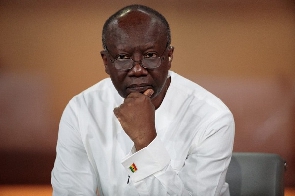 Finance Minister, Ken Ofori-Atta
Finance Minister, Ken Ofori-Atta
As the coronavirus pandemic bites countries around the globe by grinding trade and other productive activities to a halt, Ghana’s economy is expected to experience its slowest growth in about four decades – making it the worst year since the historic 1983 economic retrogression.
Finance Minister Ken Ofori-Atta has said that the deadly global pandemic will cause Ghana’s economy to see GDP growth decline significantly to 2.6 percent from a projected 6.8 percent if there is an outbreak of the disease in the country; and further tumble to 1.5 percent should the country go on a partial lockdown.
It can safely be concluded that the country has gone past the first scenario wherein an outbreak would cause a decline in growth to 2.6 percent. As of Tuesday afternoon April 4, the confirmed COVID-19 cases were 287, with some 15,000 results still waiting to be confirmed either positive or negative. Based on this, growth will surely hit below the 2.6 percent – and that will make it the first time in five years.
Then, should there be a partial lockdown of the country – which has already started in Greater Accra, Kasoa and Kumasi – the country will experience its worst growth since 1983, a period when the economy went into recession and plunged many into hunger and poverty. During that year, the economy experienced a contraction of 4.5 percent. Since then, the least growth that has ever been recorded was 2.2 percent in 2015. Therefore, the 1.5 percent projected growth will be the worst-ever economic performance experienced since 37-years ago when Ghana went into recession.
The world’s largest economies – US, China, UK, France, Germany among others – are already bearing the brunt of this pandemic. That leaves fragile economies, like developing countries, little or no hope of surviving the storm. Companies are winding-up, workers are being laid-off, lives and livelihoods are being lost, and people are locked down in their homes – all in the name of fighting this common enemy.
How the coronavirus will affect growth in Ghana
As Mr. Ofori-Atta enumerated in his parliamentary speech how the global pandemic will have negative impacts on the local economy. First is the sharp decline in crude oil prices. In the 2020 budget, revenue from crude oil was projected with a price of US$62.6 per barrel.
However, with Brent crude oil prices taking a nosedive to US$22.9 as of the end of March 30, 2020 from US$63.2 in November 2019, government estimates to lose more than GH¢5.6billion, even if the price climbs to US$30 per barrel.
Again, the pandemic has led to the closure of borders in many countries. With Ghana having its major trading partners being the European Union and China, trade volumes and values have declined due to the shutdown of borders and factories. And as an import-dependent economy, declining import volumes and values – as well as the slowdown in economic activities, the minister said, will lead to shortfalls in both import duties and other tax revenues of more than GH¢2.2billion.
Programmed Foreign Direct Investment (FDI) flows in 2020 have also slowed down due to uncertainties surrounding effects the COVID-19. Foreign investors are not able to arrive in the country to transact or even undertake feasibility studies as a result of the closure of most countries’ borders, including Ghana’s, and in many cases restrictions imposed in their own countries of origin.
Also, the travel and hospitality industry will be badly impacted. Already, hotel occupancy rates are down from 70 percent to under 30 percent, and staff are being sent home.
Agriculture, which is the largest employer of the economy, will also not be spared from effects of the pandemic. Disruptions in the supply chain could limit farmers’ access to inputs such as seeds, fertilisers and insecticides. Uncertainty and fear could also negatively impact planting decisions; and, also, a reduction in the volume of main agricultural exports as a result of the general downturn in global economic activity is expected.
The country’s budget deficit, which was initially projected at 4.7 percent – to fall within the fiscal rule target of 5 percent – will also widen to 7.8 percent, eroding all the gains made in the past three years.
This means the deficit will increase from the programmed GH¢18.9billion to GH¢30.2billion, a variance equivalent to 2.9 percent of GDP. The primary balance will also worsen from a surplus of GH¢2.8billion to a deficit of GH¢5.6billion, representing 1.4 percent of GDP.
Overall, initial cost of the deadly pandemic to the economy – which includes what the country will lose in terms of revenue and measures to contain the disease, according to the Finance Minister – is estimated to be at least GH¢9.5billion, representing 2.5 percent of GDP.
In fact, the pandemic’s effects will be far greater than explained in this piece, requiring all to tighten their belts as difficult times are coming.